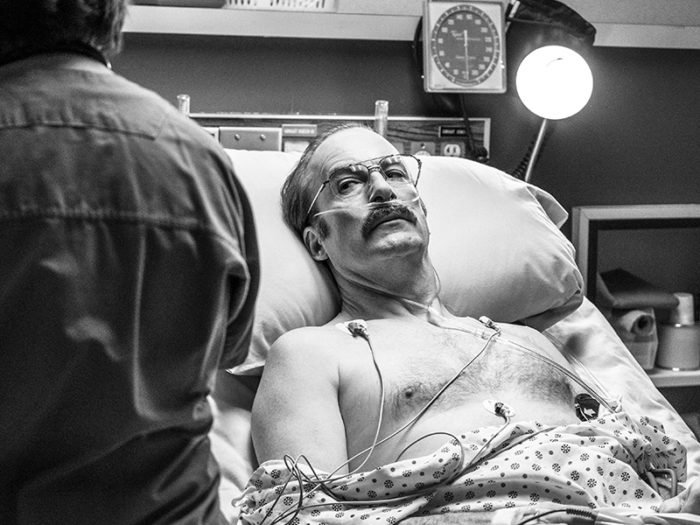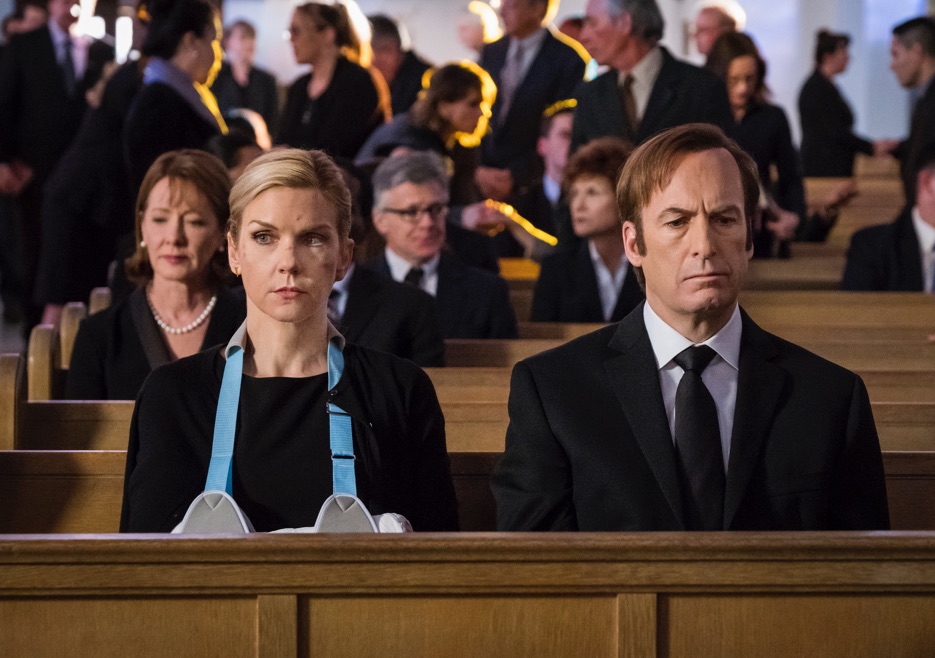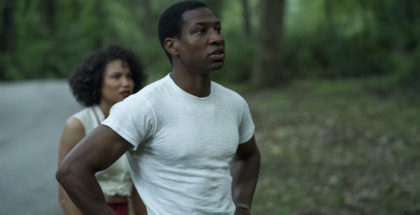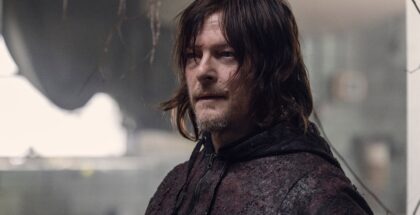Netflix UK TV review: Better Call Saul Season 4, Episode 1
Review Overview
Guilt
8Identities
8Tone
8David Farnor | On 08, Aug 2018
Warning: This contains spoilers for Season 1 to 3 of Better Call Saul. Catch up with our reviews of Season 3 here.
“I think he did what he did because of me,” says Howard (Patrick Fabian) in the opening episode of Better Call Saul Season 4. He’s referring, of course, to Chuck (Michael McKean), the brother of Jimmy (Bob Odenkirk) and founding partner of Howard’s law firm, who died in a burning house at the end of last season. Chuck’s death was a shock, after three seasons of exploring and developing the fascinating (and fiercely antagonistic) bond between the two brothers, and one that left us on tenterhooks to see how Jimmy would react to losing his dearest loved one and worst enemy. Over a year later, and it’s telling that the person reacting the most isn’t Jimmy at all.
We first see him, as always, in a cold open from an unspecified date in the future, as he goes about his mundane job at Cinnabon under the fake identity of Gene Takavic. But that mundane existence has been interrupted, and we join him as he’s out cold on the floor, before being promptly whisked away to hospital. It’s not the first time we see the aftermath of the sudden physical downturn of someone’s health this episode, and that sense of fragility sets a sombre mood for Saul’s fourth run; as the series inches yet closer still to Breaking Bad territory, the casualties and bodies are beginning to stack up.
One person who’s fighting fit, inevitably, is Mike (Jonathan Banks), the unstoppable, relentless car park attendant turned security consultant, who is now officially on the books of Gus Fring’s operation. He wastes no time in making the most of his faux position under the legitimate company of Madrigal, infiltrating their warehouse and exposing security flaws like he’s starring in his own heist flick, Ocean’s 1. Is he just establishing his cover for good measure? Protecting his own back against potential future vulnerabilities? Or scoping out something more about Fring’s business? Either way, it again distinguishes him from the rest of this ensemble of Albuquerque eccentrics and oddballs; while they’re keeling over and looking serious, he’s up and raring to go with a gravelly deadpan that’s laugh-out-loud funny.
Fring (Giancarlo Esposito) is the other one to be making big moves – and his encounter with Hector Salamanca (Mark Margolis) leaves Jimmy’s Sandpiper shenanigans from last season feeling like tiny child’s play. Because there’s more at stake here than bingo balls; these plans are life and death, from Los Pollos Hermanos taking over the supply of narcotics in the area to Nacho (Michael Mando) trying to kill his boss by substituting his heat pills for duds. Both are plays Mike was already onto and, if Giancarlo’s steely stares are anything to go by (they’re not – his impossibility to read is one of the qualities that makes Fring such an effective villain), Gus has guessed at Nacho’s scheme too. Of course, it might just be that Gus is equally keen to kill off Hector himself; the animosity between them, explored in Breaking Bad, makes for a wonderfully fraught dynamic. Either way, Nacho is being kept close, like a new, valuable friend, or closer, like the other thing. Season 4 is setting its stall out early: nobody is safe or unwatched.
Creators Vince Gilligan and Peter Gould have managed to keep all these microscopic power plays riveting for so long through a knack for structure and symmetry. And so it’s only fitting that, while the toppling of Hector is directly caused by Nacho, Howard should be wondering whether he was the cause of the collapse of Chuck’s life. In a chronological sense, perhaps, he was: the spat with Howard and Chuck’s enforced, or encouraged, retirement from HHM was the straw that broke the camel’s back, sending him spiralling into depression and reigniting his electromagnetic sensitivity to new extremes, before he kicked over a gas lamp and torched his own house.
But this has always been a tale of two directly opposed brothers and their impact upon each other. Anything done by Jimmy or Chuck in the last three seasons is guaranteed to be a reaction to something their sibling has done. Their whole lives have become a tit for tat exchange of blame and resentment. Chuck’s betrayal of Jimmy to thwart his legal career. Jimmy’s framing of Chuck for a clerical error. Chuck’s secret recording of Jimmy for malpractice. And, at the root of it all, Jimmy just existing in the first place, something Chuck took as a personal affront, from their mother’s final moments to Jimmy’s dream of being a lawyer, like his brother, which Chuck viewed as cheapening both the law and his vocation. And, perhaps most crucial of all, there’s Jimmy notifying the insurance firm about Chuck’s mental health issues, which led to the HHM resignation.
None of that is mentioned in the funeral service, which sees a string of lawyers console Jimmy and remind him how great his brother was – but it bubbles beneath the surface still, right down to the eulogy’s mention of Jimmy, a fellow legal professional, as Chuck’s surviving family member (you can bet Chuck would’ve hated that final namedrop in the speech).
Bob Odenkirk is fantastic here, still finding new layers to Jimmy to peel back, as he quietly cares for Kim (Rhea Seehorn) and then even more quietly mourns the loss of his older brother. Jimmy’s natural ability to put on a happy face has been at the heart of Jimmy’s tragic descent into the murky criminal underworld; Saul Goodman, the man he is destined to become, is all about two-faced cons and friendly deception, and it’s something that comes to Jimmy naturally, even when trying to do the right thing. Odenkirk’s charismatic presence, though, is dialled right down for this opening episode, playing out his part in near silence.
We’ve only seem him like this, well, in the opening sequence, which sees him frail and nervous, as Gene tries to get out of a hospital, filmed in sober black-and-white. A mistake around the number on a social security card is enough to put both him and us on a knife edge of tension, as he perpetually lives in fear of being rumbled – even an Albuquerque air freshener in a taxi seems like an ominous warning of people on his tail. (That’s made possible by the music and the camerawork’s carefully darkening mood; it’s a sign of how well Better Call Saul has shifted into Breaking Bad’s vein that the appearance of a Madrigal employee outside a suburban home will have you double-taking in case it’s actually Walter White turning up early.)
Odenkirk’s still Jimmy is McGill in self-preservation mode, shutting down any instincts to joke or charm his way out of a situation. And the start of Season 4 gives us our first real glimpse of that side of him – the side that can detach Jimmy’s once-undetachable compassion. Bob’s performance is matched by Patrick Fabian, who just gets better with every season, turning Hamlin from a smiling enemy to a figure of almost comic relief and, now, to a well-meaning colleague sucked into a brotherly feud. Jimmy’s reaction to Howard’s confession of guilt over Chuck’s suicide is worth tuning in to this opening episode alone for, as we see the shyster with a cross to bear spy an opportunity to conveniently load it off onto another person. Chuck never did anything that wasn’t because of Jimmy. But who’s to stop someone else thinking otherwise?
Better Call Saul Season 1 to 4 are available on Netflix UK, as part of an £9.99 monthly subscription. New episodes arrive on Tuesdays, within 24 hours of their US broadcast.






















